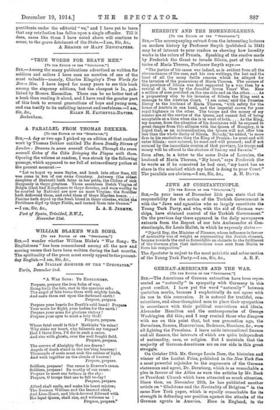HEREDITY AND THE HOHENZOLLERNS. [To THZ EDITOR 07 THZ "
SPRCTATOR.1
SIR,—The accompanying extract from the interesting lectures on modern history by Professor Smyth (published in 1841) may be of interest to your readers as showing how heredity works in the rulers of Prussia. Speaking of the resolve made by Frederick the Great to invade Silesia, part of the terri- tories of Maria Theresa, Professor Smyth says :—
" The justice of his cause was indeed, as is evident from all the circumstances of the case, and his own writings, the last and the least of all the many futile reasons which he alleged for the invasion of the possessions of Maria Theresa. The seizure of this province of Silesia was first supported by a war, then by a revival of it, then by the dreadful Seven Years' War. Near a million of men perished on the one side and on the other. . As a preparatory step to his invasion of Silesia the King sent a message to the Austrian Court. I am come,' said the Prussian Envoy to the husband of Maria Theresa, with safety for the house of Austria in one band, and the imperial crown for your royal highness in the other. The troops and the money of my master are at the service of the Queen, and cannot fail of being acceptable at a time when she is in want of both. .. . As the King, my master, from the situation of his dominions will be exposed to great danger from this alliance with the Queen of Hungary, it is hoped that, as an indemnification, the Queen will not offer him less than the whole duchy of Silesia. Nobody,' he added, ' is more firm in his resolutions than the King of Prussia : he must and will enter Silesia : once entered, he must and will proceed; and if not secured by the immediate cession of that province, his troops and money will be offered to the electors of Saxony and Bavaria.' "
Soon after, in a letter to the same Duke of Lorraine, the husband of Maria Theresa, "My heart," says Frederick (for he wrote as if he conceived he had one), "my heart has no share in the mischief which my hand is doing to your Court."
The parallels are obvious.—I am, Sir, &c., A. H. DAVIS.






































 Previous page
Previous page